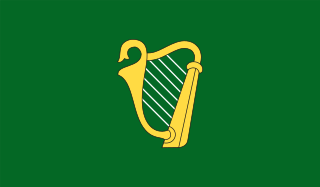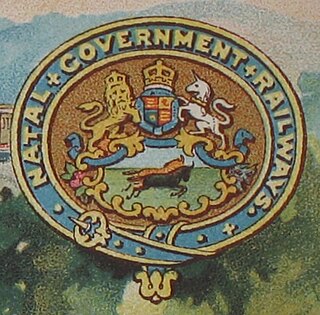
Ladysmith is a city in the Uthukela District of KwaZulu-Natal, South Africa. It lies 230 kilometres (140 mi) north-west of Durban and 365 kilometres (227 mi) south-east of Johannesburg. Important industries in the area include food processing, textiles, and tyre production. Ladysmith is the seat for both the Alfred Duma Local Municipality and Uthukela District Municipality.

The coal mining town of Dundee is situated in a valley of the Biggarsberg mountains in KwaZulu-Natal, South Africa. It is part of the Endumeni Municipality, Umzinyathi District. It is very rich in coal deposits. More populous than the town of Dundee is its adjacent township named Sibongile. This township is now being extended with many residing zones, e.g. Lindelani.

Estcourt is a town in the uThukela District of KwaZulu-Natal Province, South Africa. The main economic activity is farming with large bacon and processed food factories situated around the town. The N3 freeway passes close to the town, linking it to the rest of South Africa.

The siege of Ladysmith was a protracted engagement in the Second Boer War, taking place between 2 November 1899 and 28 February 1900 at Ladysmith, Natal.
Colenso is a town in KwaZulu-Natal, South Africa. It is located on the southern bank of the Tugela River on the R103 road. The original settlement was contained within a loop on the river, but it subsequently expanded southwards and eastwards. It lies on the main Durban - Johannesburg railway line some 190 km (118 mi) north-west of Durban.

Newcastle is the third-largest city in the province of KwaZulu-Natal, South Africa and is the province's industrial centre. The city has four industrial areas. Newcastle is known as the "New City" The majority of its citizens reside in Newcastle East in the main townships of Madadeni and Osizweni, with the balance residing in Newcastle West. Set at the foothills of the northern KwaZulu-Natal Drakensberg Mountains, Newcastle is located in the northwest corner of the province along the Ncandu River.
Bergville is a small town situated in the foothills of the Drakensberg mountains, KwaZulu-Natal, South Africa. It was established as Bergville Mountain Village in 1897 and is now the commercial centre for a 2,500 km2 dairy and cattle ranching area. A blockhouse was built by the British soldiers in the town during the Second Boer War

Ermelo is the educational, industrial and commercial town of the 7,750 km2 Gert Sibande District Municipality in Mpumalanga province, Republic of South Africa. It is both a mixed agriculture and mining region. It is located 210 km east of Johannesburg.

Two Irish Commandos, volunteer military units of guerrilla militia, fought alongside the Boers against the British forces during the Second Boer War (1899–1902).

The Johannesburg Light Horse Regiment, is a reserve armoured car reconnaissance unit of the South African Army.

The Queen Nandi Mounted Rifles is an reserve armoured regiment of the South African Army.

The Battle of Talana Hill, also known as the Battle of Glencoe, was the first major clash of the Second Boer War. A frontal attack by British infantry supported by artillery drove Boers from a hilltop position, but the British suffered heavy casualties in the process, including their commanding general Sir William Penn Symons.

The Battle of Elandslaagte took place during the Second Boer War, and was one of the few clear-cut tactical victories won by the British during the conflict. However, the British force retreated afterwards, throwing away their advantage.

The Colony of Natal was a British colony in south-eastern Africa. It was proclaimed a British colony on 4 May 1843 after the British government had annexed the Boer Republic of Natalia, and on 31 May 1910 combined with three other colonies to form the Union of South Africa, as one of its provinces. It is now the KwaZulu-Natal province of South Africa.

The Queen's South Africa Medal is a British campaign medal awarded to British and Colonial military personnel, and to civilians employed in an official capacity, who served in the Second Boer War in South Africa. Altogether twenty-six clasps were awarded, to indicate participation in particular actions and campaigns.

When the Second Boer War broke out on 11 October 1899, the Boers had a numeric superiority within Southern Africa. They quickly invaded the British territory and laid siege to Ladysmith, Kimberley and Mafeking. Britain meanwhile transported thousands of troops both from the United Kingdom itself and from elsewhere in the Empire and by the time the siege of Ladysmith had been lifted, had a huge numeric superiority.
The Battle of Ladysmith was one of the early engagements of the Second Boer War. A large British force which had concentrated at the garrison town of Ladysmith launched a sortie on 30 October 1899, against Boer armies which were slowly surrounding the town. The result was a disaster for the British. The main body was driven back into the town, and an isolated detachment of 800 men was forced to surrender to Commandant De Wet. The Boers did not follow up their advantage by proceeding towards the strategically important port of Durban, and instead began a siege of Ladysmith, which was relieved after 118 days. John Norwood was awarded the Victoria Cross for his actions during the battle.

The Natal Government Railways (NGR) was formed in January 1877 in the Colony of Natal.

Colenso Power Station was a South African coal-fired power station, located in Colenso, KwaZulu-Natal on the banks of the Tugela River. It was built in the 1920s by the South African Railways to supply electricity for the railways, and was subsequently sold to the Electricity Supply Commission (Eskom).

The South African Railways Class 1E of 1925 was an electric locomotive.



















